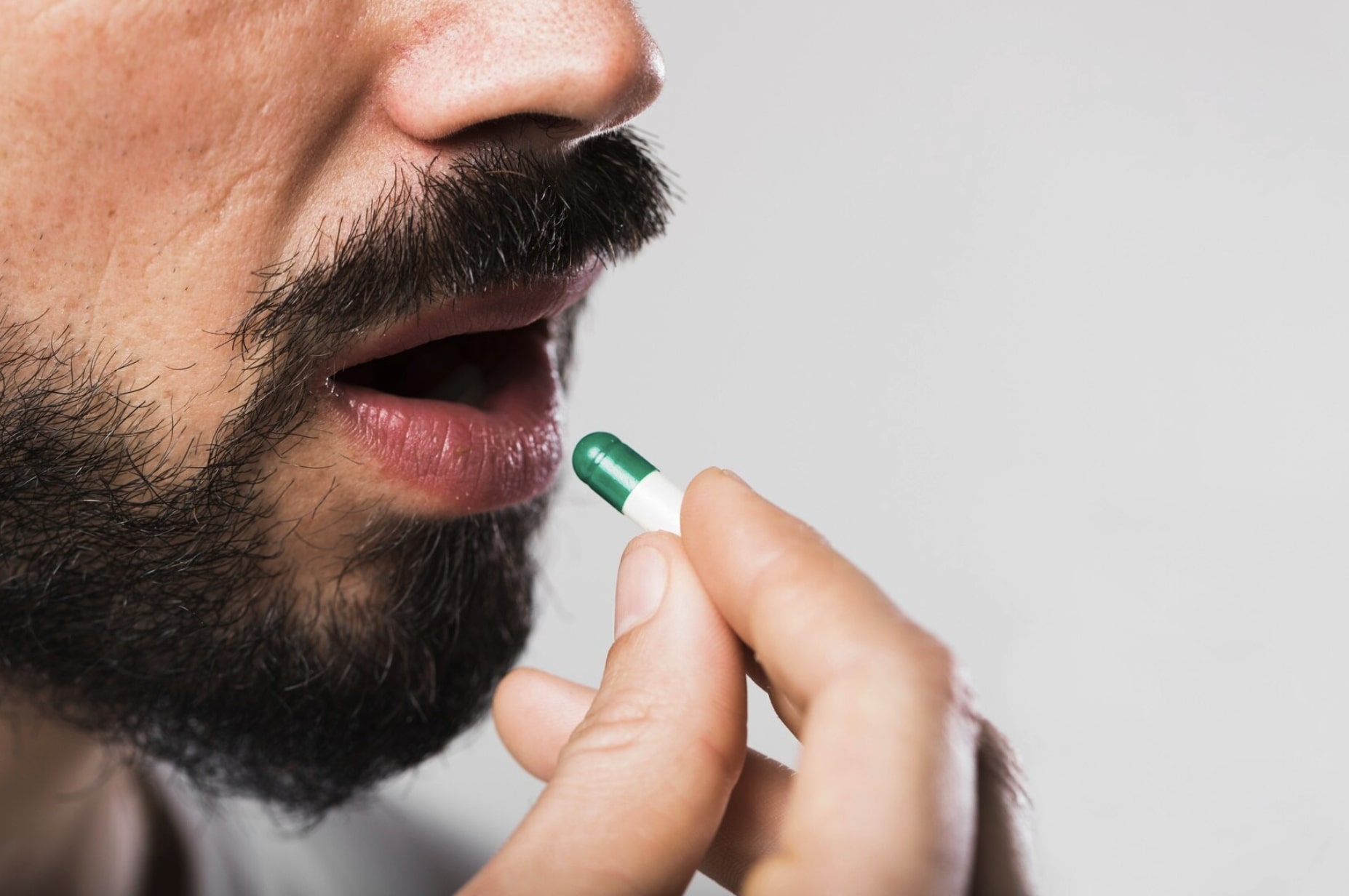What Is Low Testosterone?
For men, testosterone is a vital hormone that can fuel energy, sex drive, muscle strength, and bone health. Produced mainly in the testes, testosterone shapes male development and powers important functions throughout adulthood.Low testosterone, or hypogonadism, occurs when the body’s production of this vital hormone falls below healthy levels. The result of falling testosterone levels can become a broad collection of symptoms that can begin to negatively impact various elements of your life. While some decline in testosterone is a natural part of aging, a significant drop can signal an underlying health issue or create a hormone imbalance in men that disrupts everyday life. Studies show that after age 30, testosterone levels can fall about 1% each year—meaning millions of men find themselves dealing with the signs of low testosterone at some point. (1)Recognizing these issues early and beginning treatment is key. In this guide, we’ll discuss the common symptoms of low T to look out for, reasons that your testosterone levels may be dropping (beyond aging), and how and when you should get tested.
Common Symptoms of Low Testosterone
The signs of low T in men can vary widely, depending on your age, lifestyle, and the level of testosterone drop you’re experiencing. Here are some of the most common testosterone deficiency signs for men to look out for:
Low Sex Drive (Libido)
A decrease in sexual desire is often one of the earliest and most noticeable signs of low testosterone. If your interest in sex has slipped without explanation, it may be tied to your hormone levels and not just stress or relationship changes.
Erectile Dysfunction
Testosterone supports healthy erections by stimulating receptors in the brain that produce nitric oxide, a chemical that helps start and sustain an erection. (2) Low T can make it harder to achieve or maintain an erection and cause erectile dysfunction, even if your sex drive remains intact.
Fatigue and Low Energy
For men who feel exhausted and low energy even when getting consistent rest, low T could be a culprit. Persistent fatigue is a highly reported deficiency sign for men with hypogonadism. Many men describe a lasting dip in energy, motivation, or endurance that doesn’t improve with sleep.
Loss of Muscle Mass and Bone Density
Testosterone helps build muscle and maintain strong bones. Men with low T may notice a slow, steady decrease in muscle and strength, or even report more frequent aches, pains, or injuries due to reduced bone density. Some studies even have indicated that hypogonadism could be a significant factor in male osteoporosis. (3)
Increased Body Fat and Weight Gain
A hormone imbalance in men can trigger stubborn fat gain, especially around the belly. Men with low testosterone often report it becomes harder to lose weight and easier to put on pounds, even if exercise and diet habits don’t change much.
Mood Issues: Depression, Irritability, Brain Fog
Testosterone helps regulate mood, cognitive sharpness, and emotional resilience. Low levels of testosterone can, in turn, lead to increased irritability, feelings of depression, or persistent brain fog.
Sleep Problems: Insomnia, Disrupted Patterns
Many men with low testosterone struggle with sleep, waking up frequently through the night. Ongoing sleep disruptions can worsen other low T symptoms, feeding a frustrating cycle of exhaustion and irritability. Research shows that poor sleep quality affects as much as 50% of men with low testosterone. (4)If two or more of these symptoms sound familiar to your situation, it’s time to consider your hormone health.
Why Testosterone Levels Drop
Understanding the root causes of a drop in testosterone can help you take steps to protect (or restore) your hormonal balance. While the exact reasons will depend on your age, health history, lifestyle choices, and other factors, here are some of the top reasons why men may see a drop in testosterone levels.
Age-Related Decline
Testosterone production typically peaks in late adolescence and twenties and starts to decline steadily around the age of 30. While this decrease is natural, symptoms of low T aren’t inevitable with age as other factors often contribute.
Medical Conditions and Injuries
Some common health problems can accelerate testosterone loss and lead to hypogonadism. Primary hypogonadism, which originates from the testes, may be caused by (5):
- Klinefelter syndrome
- Mumps orchitis
- Hemochromatosis (too much iron in blood)
- Injury to the testicles
- Chemotherapy or radiation treatment for cancer
Secondary hypogonadism, which indicates a problem in the hypothalamus or the pituitary gland, can be caused by:
- Obesity (being overweight can increase estrogen and decrease testosterone production)
- HIV/AIDS
- Pituitary disorders
- Kallmann's syndrome
- Certain inflammatory diseases such as sarcoidosis, histiocytosis X and tuberculosis
Lifestyle Factors
Certain lifestyle factors, such as long-term stress, a poor diet, excess alcohol, and lack of physical activity can all disrupt hormonal health. Even psychological stress, such as professional stressors or burnout or a major personal upheaval, has been shown to temporarily lower testosterone. (6)
When to Get Tested
If you’re noticing persistent signs of low T in men, timely testing can give you answers and provide relief. If you notice two or more common symptoms listed above it may be time to talk to a trusted provider, such as those at Gameday Men’s Health. You may also want to get checked if you notice your symptoms are interfering with work, relationships, quality of life, or if you have individual risk factors such as obesity, diabetes, sleep apnea, or severe injury.Testing testosterone is a straightforward process, but it’s important to ensure proper procedures for accuracy are being followed. Testing is performed with a blood sample, and it is typically best to be done when testosterone levels are the highest, typically in the morning. Because hormone levels can fluctuate, your provider may also order repeat tests to confirm a diagnosis. (7)
How Low Testosterone Is Treated
Addressing low T starts with identifying the root cause, then choosing the best treatment options for your needs and goals.
Step 1: Lifestyle First
Often, improving diet, exercise, sleep quality, and managing stress can boost testosterone naturally. Working out can help increase testosterone, and regular strength training, clean eating, weight management, and good sleep habits help support healthy hormone levels.
Step 2: Testosterone Replacement Therapy (TRT)
When lifestyle changes aren’t yielding the results you’re looking for, or when clinically significant hormone deficiency is confirmed, testosterone replacement therapy is a safe, proven option when overseen by a trusted clinician. At Gameday Men's Health, we offer personalized TRT designed specifically for men. Our options include:
- Injections: Fast-acting, precise dosing, usually administered weekly at home or in the clinic.
- Pellets: Implanted under the skin for long-lasting, steady hormone release (convenient, no daily pills).
- Oral Therapies: For those preferring a non-injection option.
Our expert providers closely monitor progress to ensure optimal results with minimal side effects for TRT patients once a diagnosis is confirmed.
Benefits of Treating Low T
Treating low testosterone can transform how you feel day-to-day and protect your long-term health.Effective treatment may lead to boosted energy and stamina, a stronger sex drive and improved erectile dysfunction, sharper mood and mental clarity, increased muscle mass and bone density, and enhanced body composition. However, it is important to note that each patient is different, and exact results will vary. Most importantly, restoring hormonal balance helps men regain control over their health and happiness. This change can often lead to better sleep, reduced stress, and improved relationships, work performance, and longevity. Optimal testosterone levels reinforce everything from your muscles and bones to your mind and motivation.
Take the Next Step With Gameday Men's Health
If you’re experiencing signs of low testosterone and believe it may extend beyond the typical decline of aging, don’t wait for symptoms to worsen. At Gameday, we are proud to provide fast and accurate testosterone testing done on site in a private, comfortable setting that’s geared towards men. Once low T has been identified, our team creates comprehensive, tailored treatment plans designed to support personal goals and get you back to feeling like yourself. If you’re ready to regain control over your testosterone levels —schedule your hormone evaluation today by contacting your local Gameday Men’s Health clinic. References
- Why Are Testosterone Levels Decreasing?
- Testosterone and Erectile Function: From Basic Research to a New Clinical Paradigm for Managing Men with Androgen Insufficiency and Erectile Dysfunction
- Testosterone and Bone Health in Men: A Narrative Review
- The Global Problem of Insufficient Sleep and Its Serious Public Health Implications
- Male hypogonadism
- How does stress affect testosterone levels?
- Testosterone Levels Test
FAQ Section
What is the most common symptom of low testosterone?
A noticeable drop in libido is often the first sign men notice, followed by persistent fatigue.
How is low testosterone diagnosed?
Low testosterone is typically diagnosed with two separate blood tests, usually done in the morning when levels are expected to be highest. However, in older men or those with testosterone deficiency, this daily fluctuation often disappears, so timing may be less critical. Doctors may also check free testosterone and other hormones like LH and FSH to get a fuller picture of what’s going on.
Is TRT safe?
When prescribed and monitored by a qualified provider, TRT can significantly improve symptoms with minimal risk.
Can lifestyle changes fix low testosterone?
Yes, particularly weight loss, strength training, sufficient sleep, and stress reduction can boost hormone levels naturally.
When should I see a doctor?
If you experience multiple symptoms like fatigue and low sex drive for several weeks, talk to a healthcare provider and consider testing.











